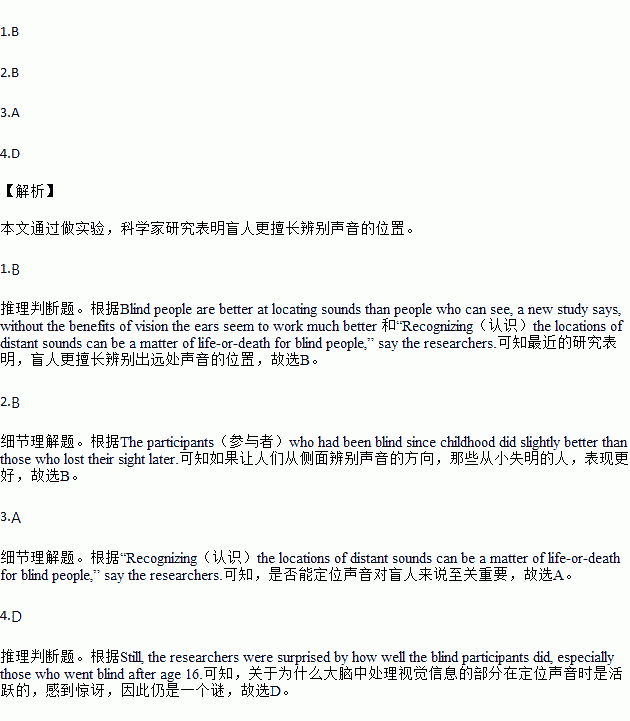题目内容
Where is that noise coming from? Not sure? Try living with your eyes closed for a few years.
Blind people are better at locating sounds than people who can see, a new study says, without the benefits of vision the ears seem to work much better
Previous studies have shown that blind people are better than others at reaching out and touching the sources of sounds that are close by. Researchers from the University of Montreal wanted to see if blind people were also better at locating sounds that are far away.
Twenty-three blind people participated in the study. All had been sightless for at least 20 years. Fourteen of them had lost their vision before age 11. The rest went blind after age 16. The experiment also included 10 people who could see but were wearing blind-folds.
In one task, volunteers had to pick the direction of a sound coming from about 3 metres away. When the sound was in front of them or slightly off center in front, both groups performed equally well.
When sounds came from the side or the back, however, the blind group performed much better than the blindfolded group. The participants(参与者)who had been blind since childhood did slightly better than those who lost their sight later.
“Recognizing(认识)the locations of distant sounds can be a matter of life-or-death for blind people,” say the researchers. Crossing the street, for instance, is much harder when you can’t see the cars coming.
Still, the researchers were surprised by how well the blind participants did, especially those who went blind after age 16. In another experiment, the scientists also found that parts of the brain that normally deal with visual(视觉的)information became active in locating sound in the people who were blind by age 11. These brain parts didn’t show sound-location activity in the other group of blind people or in the sighted people. The scientists now want to learn more about the working of brains of “late-onset” (迟发性的)blind people.
1.The recent study shows blind people are better at telling ________________.
A. The sources of loud sounds. B. the locations of distant sounds
C. the direction of sharp sounds D. the distance of a sound in front of them
2.If people were asked to tell the direction of a sound from the side, who would perform best?
A. Those who are blind.
B. Those who have gone blind since children.
C. Those who went blind at age 16.
D. Those who are blindfolded.
3.Which of the following is true according to the passage?
A. Whether to be able to locate the sounds can be of vital(生死攸关的) importance for the blind.
B. All the volunteers in the experiment are sightless.
C. All the participants did equally well when picking sounds from whatever direction.
D. The later people become blind, the better they can perform in telling the direction of sounds.
4.What do we know about that parts of brain dealing with visual information are active in locating sounds?
A. This happens in almost all the testers.
B. This only happens in the people who were blind after age 16.
C. It remains nothing new to the scientists any more.
D. It remains a mystery why it is so.

